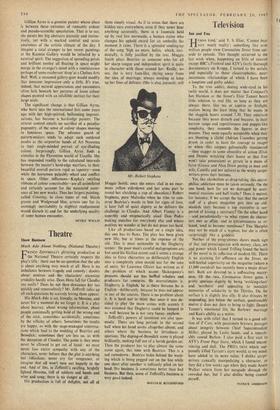Theatre
Show Business
Much Ado About Nothing. (National Theatre.) FRANCO ZEFFIRELLI'S glittering production at the National Theatre certainly respects the play's title: there can be no question that the ado is about anything very much at all. Here is no imbalance between tragedy and comedy : doubts about motives and the characters' excessive credulity hardly arise. Does Hero fall for Claudio too easily? Does he not then denounce her too quickly and remorselessly? Mr. Zeffirelli tidies up all such questions by scarcely letting them appear.
His Much Ado is set, literally, in Messina, and never for a moment do we forget it. It is a play about hearsay, about wrong information, about people continually getting hold of the wrong end of the stick, sometimes accidentally, sometimes by the villainy of others. Sometimes the results are happy, as with the stage-managed conversa- tions which lead to the wedding of Beatrice and Benedick; sometimes they are less so, as with the deception of Claudio. The point is they must never be allowed to get out of hand: we must never lose entire sympathy with any of the characters, never believe that the plot is anything but ridiculous, never cry for vengeance, or imagine that all won't turn out happily in the end. And of this, in Zeffirelli's swirling, brightly lighted Messina, full of soldiers and bands and wine and song, there is no danger at all.
His production is full of delights, not all of them simply visual. As if to stress that there are hidden ears everywhere, even if they never hear anything accurately, there is a fountain held up by real live mermaids, a human statue who changes his upheld sword for an umbrella the moment it rains. There is a splendid sending-up of the song 'Sigh no more, ladies, which, inci- dentally, is fully justified by the text. Maggie Smith plays Beatrice as someone who for all her sharp tongue and independent spirit is quite in character with those around her. Really, we see, she is very faun-like, shying away from the idea of marriage, always needing to keep up her lines of defence. (She is also, joyously. still
Mr. Robert Stephens
Maggie Smith; once she enters clad in an enor- mous yellow eiderdown and her arms part to reveal her clutching a cup of chocolate.) Robert Stephens, pure Malvolio when he tries to con- strue Beatrice's words to him for signs of love, is later full of quiet dignity as he delivers the challenge to Claudio. And Albert Finney is a superbly and enigmatically aloof Don Pedro making matches for everybody else and whose motives we wonder at but do not press too hard.
Like all productions based on a single idea, this one has its flaws. The play has been given new life, but at times at the expense of the old. This is most noticeable in the Dogberry scenes: the poor man's careful malapropisms are lost amid his Sicilian accent and it seems a strange idea to force characters so deliberately English into a completely alien mould just for the sake of unity. Sir Laurence Olivier has written as if the problem of which accent Shakespeare's peasants should use has baffled scholars and producers for centuries. He overestimates it. Dogberry is English, he is there because he is English—deliberately, because he does not• appear in any of the sources. There is no problem about it. It is hard not to think that once it was de- cided to play the main scenes with accents it was assumed that Dogberry could be lumped in as well because he is not very funny, anyhow.
Zeffirelli's powers of invention are also spas- modic. There are long periods in the second half when his hand seems altogether absent, and others where the business he introduces is spurious. The duping-of-Benedick scene is played brilliantly, making full use of a lavish garden set. Then the producer has to play almost the same scene again, this time with Beatrice. This is a sad comedown: Beatrice hides behind the wash- ing which is being pegged out on the line while one sheet after another is tediously piled on her head. No business is sometimes better than bad business. But then, some of Zeffirelli's business is very good indeed.
MALCOLM RUTHERFORD


































 Previous page
Previous page